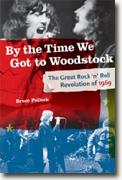By the Time We Got to Woodstock
Bruce Pollock
book reviews:
· general fiction
· chick lit/romance
· sci-fi/fantasy
· graphic novels
· nonfiction
· audio books
· author interviews
· children's books @
curledupkids.com
· DVD reviews @
curledupdvd.com
newsletter
win books
buy online
links
home
for authors
& publishers
for reviewers

 |
By the Time We Got to Woodstock: The Great Rock 'n' Roll Revolution of 1969 Bruce Pollock Backbeat Books Paperback 300 pages August 2009 |
|
Bruce Pollock has written a dozen books and been published in a litany of musical publications. There's a lot of information here, all presented in support of his central theme: that 1969 was the pivotal year in terms of "music-as-manifesto and rock-as-revolution." As themes go, that's a good one (though, arguably, 1967 was the essential year in terms of the real steps made in the progression of pop, rock, and prog music).
If not for The Beatles' fortuitous and mammoth takeover of our airwaves, who knows how many of these entities [talking about other English bands] would have gone the way of [Cliff] Richard into the shadows of history unrequited? For instance, did Domenico Modugno launch an Italian Invasion with "Volare" or Kyo Sakimoto a Japanese Invasion with "Sukiyaki"? They did not.On the surface, everything he says is true - The Beatles opened the doors. But citing Japanese and Italian artists who failed to do the same with their national musical styles and then saying that "without The Beatles there might never have been a scruffy Rolling Stones" is a ridiculous argument. Firstly, America didn't understand Italian or Japanese, and no foreign-speaking artist has ever truly translated in a huge way in the U.S. Secondly, there would have been the Rolling Stones - only it may have taken several more years for them to appear. In the next paragraph, he talks about guitar players and states, "Jeff Beck, Eric Clapton, and Jimmy Page all passed through the school of John Mayall." No, they didn't. Clapton played briefly with Mayall's Bluesbreakers, but Beck and Page never strummed with John. Then, he is forever mentioning album and in quotes pulling out song titles. It's uncertain whether he's just giving examples of tracks from the albums or using the songs he thinks best represent that album. If the latter is true (and seemingly that is what he is doing), then he again misses the point. Earlier in the book he talks about Jeff Beck's Truth album and mentions "I Ain't Superstitious" as the sample track. A great song, but not the one that defines the album. There are better books out there on this type of subject - Barney Hoskyns and Mikal Gilmore are two authors who write about this stuff. Just a little bit too much information here and not enough cohesion. Originally published on Curled Up With A Good Book at www.curledup.com. © Steven Rosen, 2009 |
| Also by Bruce Pollock: |
|
|
|
 Click here to learn more about this month's sponsor! |
|
| fiction · sf/f · comic books · nonfiction · audio newsletter · free book contest · buy books online review index · links · · authors & publishers reviewers |
|
| site by ELBO Computing Resources, Inc. | |
 But the pages here seem disjointed; ideas jump from one to another without any sense of continuity.
For instance, in a chapter titled "The Joy Segues," Pollock writes,
But the pages here seem disjointed; ideas jump from one to another without any sense of continuity.
For instance, in a chapter titled "The Joy Segues," Pollock writes,